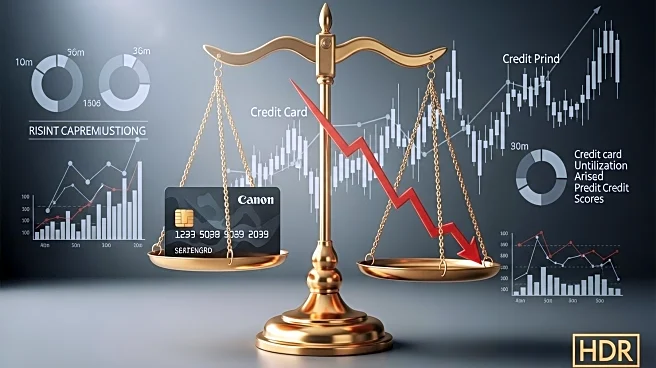What's Happening?
The national FICO score, a key indicator of creditworthiness, has dropped by two points to 715, according to FICO's inaugural FICO Score Credit Insights report. This decline is attributed to increased credit card utilization and a rise in missed payments, partly due to the resumption of student loan delinquency reporting. The report highlights that many consumers are relying more heavily on credit cards, with average utilization rising to 35.5% in 2025 from 29.6% in 2021. Gen Z, aged 18 to 29, experienced the largest average FICO score decrease, down three points year-over-year, reflecting greater financial volatility. The report also notes a shift in the payment hierarchy, with consumers prioritizing auto loans over mortgages and personal loans.
Why It's Important?
The decline in FICO scores is significant as it affects consumers' ability to secure loans and credit cards, influencing interest rates and credit limits. A lower score suggests higher risk to lenders, potentially leading to stricter borrowing conditions. The report indicates a K-shaped recovery, where economic improvement is uneven, with some consumers moving into higher or lower score brackets. This trend underscores the financial challenges faced by younger generations, particularly those burdened with student loans. The shift in payment priorities reflects strategic financial management by consumers, aiming to protect essential assets amid economic uncertainty.
What's Next?
As consumers continue to navigate financial challenges, monitoring credit health will remain crucial. The report suggests that more Americans are checking their credit scores regularly, indicating increased awareness and proactive management. Financial institutions may adjust lending criteria in response to changing credit profiles, potentially impacting loan availability and terms. Policymakers and financial advisors might focus on strategies to support consumers, particularly younger generations, in managing debt and improving financial literacy.
Beyond the Headlines
The report highlights broader economic implications, such as the impact of student loan debt on financial stability and the potential for increased financial inequality. The uneven recovery could exacerbate existing disparities, prompting discussions on policy interventions to support vulnerable groups. The strategic financial choices made by consumers may influence future credit market dynamics, with potential shifts in lending practices and consumer behavior.









